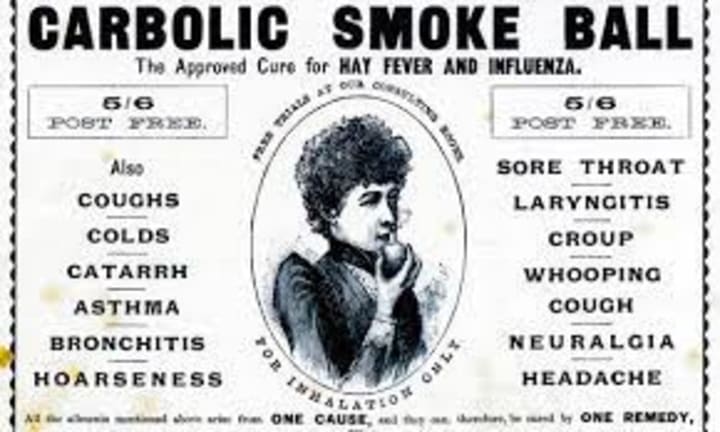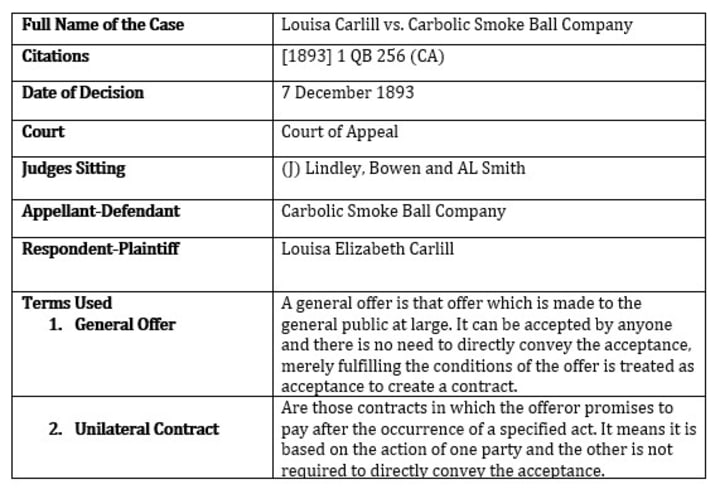The story of the carlill V carbolic case.
The smoke ball company in 1893.

Introduction,
In the annals of English law, certain cases have stood the test of time, leaving an indelible mark on legal principles and shaping the course of jurisprudence. One such landmark case is Carlill v Carbolic Smoke Ball Company. This article delves into the history, impact, and importance of this iconic case within the framework of English law

History of the Case:
In the late 19th century, during the peak of the influenza epidemic, the Carbolic Smoke Ball Company advertised a product called the "Carbolic Smoke Ball" in newspapers. The advertisement claimed that using the ball as directed would prevent the flu. To back their claims, the company offered a substantial sum of money as a reward to anyone who contracted the flu after using the product. Mrs. Carlill, a customer, purchased and used the smoke ball but still fell ill. She subsequently sued the company to claim the advertised reward. Customer Mrs. Carlill bought a Carbolic Smoke Ball and used it as directed, but she still got the illness. She then attempted to collect the advertised incentive. Mrs. Carlill filed a lawsuit against the Carbolic Smoke Ball Company when it declined to accept the compensation.
The English High Court's Queen's Bench Division heard the case in 1892. The advertisement & the words used to make the offer were closely scrutinized by the court. It found that the advertisement was a unilateral offer because it promised to give the award to anyone who met the requirements. The court determined that the advertisement represented a binding contract, not only an invitation to treat, that invites others to make an offer. The problem of consideration, a component required for the establishment of a contract, was also examined by the court. It decided that even though Mrs. Carlill had previously paid for the item, her purchase and usage of the smoke ball constituted legitimate compensation. The court noted that the business had made a clear offer with explicit terms and conditions in order to profit financially from the purchase of their product.
Ultimately, the court ruled in favor of Mrs. Carlill, claiming that by acquiring and using the smoke ball, she had accepted the offer. It was mandated that the promised reward be paid by the Carbolic Smoke Ball Company. The Carlill v. Carbolic Smoke Ball Company decision established significant legal precedents, defining the meaning of consideration, defining the principles of acceptance and offer in contract law, and establishing the binding character of ads. It is still discussed and researched in legal practice and education today since it was such a significant case in the development of English law.

Impact of the Case:
Contractual Offer: As a result of this case, the legal definition of a contractual offer has been clarified. The advertisement, according to the court, was a binding offer that could be taken by anyone who met the prerequisites and wasn't just an invitation to treat. Unilateral Contracts: In a unilateral contract, one party promises to perform a specified act in return for the other party performing another specific act, as set forth in Carlill v. Carbolic Smoke Ball Company. The needed act was carried out by Mrs. Carlill when she utilized the smoke ball to accept the offer. Consideration: A key concept in contract law, consideration has been further explained by the decision. Despite the fact that the buyer had already paid for the good, the court determined that the purchase and usage of the smoke ball constituted sufficient consideration. Exception to Offeror's Knowledge: In accordance with a legal ruling, it was determined that notifying an offeror of one's acceptance isn't always compulsory for it to count. Providing that actions exhibited by the offeree demonstrate approval and if communication isn't necessary due to a waiver from the offeror, acknowledgement remains legitimate.
Importance of the Case:
Legal precedent for legally binding offers: The case of Carlill v Carbolic Smoke Ball Company established a precedent for advertisements that constitute binding offers. This means that ads can be considered as offers if they contain clear, specific, and definite terms. Therefore, this ruling is significant in determining whether an advertisement serves as a legally enforceable contract. Consumer Protection: The aforementioned verdict played a vital role in protecting consumers as it prompted companies to take responsibility for inaccurate or deceitful promotional statements. It served as a precedent that clarified the fact that corporations cannot dodge legal repercussions by merely presenting grandiose pledges without facing consequences. Clarity in Contractual Terms: Clarity and precision in contractual terms were underscored in this case as crucial factors. The ruling highlights that any offer made should have definite conditions and be legally binding only when those conditions are met. Encouraging Public Reliance: The court's decision to enforce the reward pledged by the company fostered faith in advertisements among the public and motivated them to rely on these advertisements without suspicion. This ruling emphasized that corporations must fulfill their advertised commitments. Evolution of Contract Law: The landmark case of Carlill v Carbolic Smoke Ball Company played a significant role in the development of contract law. Specifically, the case shaped the way offer and acceptance, consideration, and contract formation are viewed in legal practice today.
Conclusion:
An important chapter in English legal history is the Carlill v. Carbolic Smoke Ball Company case. It established the binding nature of advertisements, clarified the idea of consideration, and strengthened the idea of unilateral contracts, all of which created significant precedents in the field of contract law. The case had a significant impact on more than just legal doctrines; it also helped safeguard consumer rights, promote public trust, and influence the development of contract law in UK.
About the Creator
Enjoyed the story? Support the Creator.
Subscribe for free to receive all their stories in your feed. You could also pledge your support or give them a one-off tip, letting them know you appreciate their work.






Comments
There are no comments for this story
Be the first to respond and start the conversation.